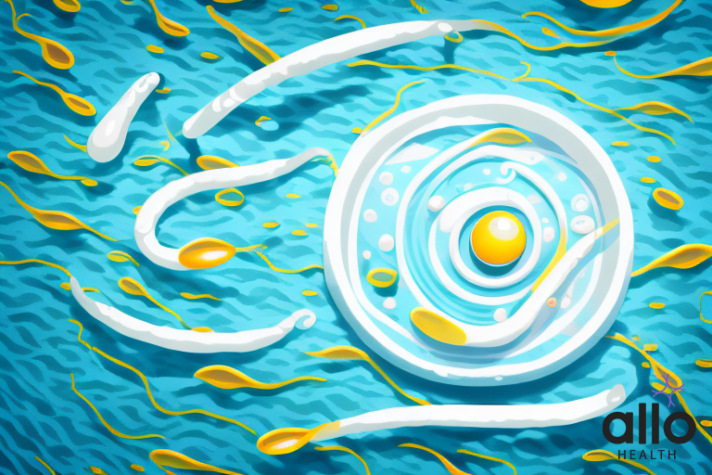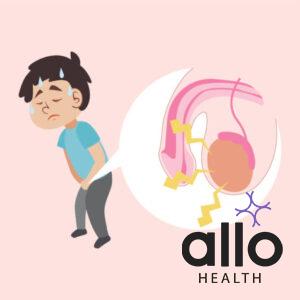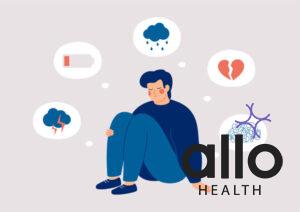Understanding Sperm Cramps: Causes and Treatments

Allo Health is dedicated to personalized well-being, offering support and trusted information tailored to individual health goals. The platform emphasizes human-generated content, led by a distinguished medical team of experts, including physicians and sexual health specialists. Their commitment to credibility involves rigorous fact-checking, authoritative research, and continuous updates to ensure accurate, up-to-date information. Allo Health's unique approach goes beyond conventional platforms, providing expert-led insights and a continuous commitment to excellence, with user feedback playing a crucial role in shaping the platform's authoritative voice.

Dr Dodda Basavaraj did his MBBS from Vijayanagara Institute Of Medical Sciences, Ballari . His domain of interest always lied in obstetrics , gynaecology and sexual health. He has worked as Medical officer, Tele-consultation doctor at tertiary and primary health care sectors in Karnataka . He believes strongly in medical practice which is evidence based, non-judgemental and patient centric.
Why This Was Upated?
Our experts continually monitor the health and wellness space, and we update our articles when new information became available.
Updated on 13 July, 2024
- Article was updated as part of our commitment to diversity, equity, and inclusion.

"The following blog article provides general information and insights on various topics. However, it is important to note that the information presented is not intended as professional advice in any specific field or area. The content of this blog is for general educational and informational purposes only.
Book consultation
The content should not be interpreted as endorsement, recommendation, or guarantee of any product, service, or information mentioned. Readers are solely responsible for the decisions and actions they take based on the information provided in this blog. It is essential to exercise individual judgment, critical thinking, and personal responsibility when applying or implementing any information or suggestions discussed in the blog."
Sperm cramps, also known as epididymal hypertension, are an uncomfortable and often painful sensations experienced by some individuals following orgasm . This phenomenon, while not well understood, affects a considerable percentage of the population and can significantly impact one’s quality of life. In this article, we will discuss the symptoms, causes, diagnosis, and treatments of sperm cramps, providing valuable insights to those suffering from this condition.
What are Sperm Cramps?
Every person’s body responds uniquely to sexual arousal and orgasm. While some may experience sensations of pleasure and release, others may experience pain and discomfort in the testicles. Sperm cramps or semen cramps, known medically as post-orgasmic pain syndrome (POPS), are one such response some individuals may experience after ejaculation.
“Sperm cramps” basically refers to a condition called testicular pain or testicular discomfort that occurs after ejaculation. This discomfort can be characterized as aching or cramping sensations in the testicles or the surrounding area.
What are the causes of sperm cramps?
The pain associated with sperm cramps can range from mild discomfort to severe pain that lasts for hours or even days. The exact causes of sperm cramps is unknown but it can be due to any of the following reasons-
Prostate issues: Conditions such as prostatitis (inflammation of the prostate gland) or an enlarged prostate can cause discomfort or pain during ejaculation.
Muscle tension: Excessive tension or contraction of the abdominal and pelvic floor muscles during sexual activity can lead to cramping or discomfort.
Infections: Infections of the reproductive organs, such as epididymitis (inflammation of the epididymis) or urinary tract infections, can cause pain or cramping sensations.
Testicular issues: Certain testicular conditions like testicular torsion (twisting of the testicles) or varicocele (enlarged veins in the scrotum) may cause testicular pain or cramps during ejaculation.
Post-orgasmic illness syndrome (POIS): POIS is a rare condition characterized by various symptoms, including muscle aches and pain, fatigue, and discomfort, following ejaculation.
Other factors: Psychological factors such as anxiety, stress, and depression may elevate the risk of developing sperm cramps. Additionally, physical factors such as prolonged abstinence, vigorous sexual activity, and hormonal imbalances may also trigger the occurrence of sperm cramps.
If you experience persistent or severe pain after ejaculation, it is important to speak with a healthcare provider to rule out any underlying medical conditions.
Symptoms of Sperm Cramps

Sperm cramps are typically characterized by a sharp pain or dull ache felt in one, or both, testicles following ejaculation. This pain may range in severity and duration and can last for several hours to days. Some individuals may also experience discomfort in the groin, lower abdomen, or perineum. In severe cases, the pain may also radiate to the back or legs, leading to mobility issues.
Aside from pain and discomfort, sperm cramps may also cause other symptoms. These can include swelling or inflammation of the testicles, redness or tenderness in the scrotum, and difficulty urinating. In some cases, individuals may also experience a decrease in sexual desire or performance due to the pain and discomfort associated with sperm cramps.
If you experience any of these symptoms, it is important to seek medical attention. Your healthcare provider can help diagnose the underlying cause of your sperm cramps and recommend appropriate treatment options.
Psychological Factors Contributing to Sperm Cramps

Sperm cramps, also known as testicular pain or testicular cramps, can have various underlying causes, and psychological factors can play a role in contributing to this condition that include-
Stress and Anxiety: High levels of stress and anxiety can have physical manifestations throughout the body, including the genital area. Stress can cause muscle tension and tightness, which may lead to discomfort or cramping in the testicles. Anxiety can also affect blood flow and hormone levels, potentially contributing to testicular pain.
Hypochondria or Health Anxiety: People with hypochondria or health anxiety often have excessive concerns about their health and tend to focus on bodily sensations, which can lead to heightened awareness of any discomfort, including testicular pain. This heightened focus and worry can exacerbate the perception of pain and discomfort.
Sexual Performance Anxiety: Anxiety or stress related to sexual performance can manifest as physical symptoms, including testicular pain. Fear of failure or concerns about sexual performance can create tension and anxiety, which may contribute to discomfort in the testicles.
Psychological Trauma: Past traumatic experiences, such as sexual abuse or other forms of trauma, can have long-lasting effects on mental and physical health. Testicular pain or discomfort may be a somatic expression of unresolved psychological trauma.
Psychosomatic Factors: Psychosomatic factors refer to the interaction between psychological processes and physical symptoms. In some cases, psychological distress, such as depression or emotional distress, can manifest as physical pain in various parts of the body, including the testicles.
It’s important to remember that psychological factors may interact with physiological causes or medical conditions, rather than being the sole cause of sperm cramps. It’s advisable to consult with a healthcare professional who can evaluate your specific situation, conduct a thorough examination, and provide an accurate diagnosis and appropriate treatment options.
Physical Factors Contributing to Sperm Cramps
Physical factors that can contribute to sperm cramps include:
Abdominal Pain: Abdominal pain can sometimes be associated with testicular discomfort or cramps. Conditions such as kidney stones or hernias can cause referred pain to the testicles, leading to sperm cramps.
Pelvic Pain: Pelvic pain, which can be caused by various conditions like prostatitis or urinary tract infections, may radiate to the testicles and result in discomfort or cramps.
Intense Pain: Severe or intense testicular pain can be indicative of a more serious condition such as testicular torsion or epididymitis. These conditions require immediate medical attention.
Pain During Sex: Testicular pain or cramps during sexual activity can be caused by various factors, including infection, injury, or anatomical abnormalities. It’s important to consult a healthcare professional for a proper diagnosis and treatment.
Sperm Buildup: If there is a prolonged period of sexual arousal without ejaculation, there can be a buildup of sperm in the seminal vesicles. This can cause discomfort or cramping in the testicles until ejaculation occurs.
Accumulation of Sperm: In rare cases, an accumulation of sperm in the seminal vesicles or ejaculatory ducts can lead to discomfort or cramping in the testicles.
Structural Abnormalities: Structural abnormalities in the reproductive system, such as a cyst or abnormal growth, can cause physical discomfort and result in sperm cramps.
Inflammatory Diseases: Inflammatory conditions like orchitis (inflammation of the testicles) or prostatitis (inflammation of the prostate gland) can cause testicular pain and cramping.
Seminal Vesicles: Dysfunction or inflammation of the seminal vesicles, which store and produce seminal fluid, can contribute to testicular discomfort or cramps.
Ejaculatory Duct: Obstruction or inflammation of the ejaculatory ducts, through which sperm pass during ejaculation, can cause pain and cramping in the testicles.
Additionally, prolonged abstinence, vigorous sexual activity, and hormonal imbalances may also trigger the occurrence of sperm cramps. Prolonged abstinence can lead to the buildup of sperm in the epididymis, resulting in increased pressure and discomfort following ejaculation.
Vigorous sexual activity may cause inflammation and injury of the epididymis or surrounding tissues, resulting in pain and discomfort. Hormonal imbalances, where the body produces an excess of androgens, can also cause the overproduction of seminal fluid, leading to an increased prostate size and pressure in the epididymis.
Another physical factor that can contribute to sperm cramps is varicocele, which is a condition where the veins in the scrotum become enlarged and twisted. This can cause a buildup of blood in the testicles, leading to discomfort and pain during ejaculation. Additionally, certain medications such as antidepressants and blood pressure medications can also cause sperm cramps as a side effect.
It is important to note that while sperm cramps can be uncomfortable and painful, they are usually not a cause for concern and can be treated with over-the-counter pain relievers and rest. However, if the pain persists or is accompanied by other symptoms such as fever or swelling, it is important to seek medical attention to rule out any underlying conditions.
How Are Sperm Cramps Diagnosed?
Sperm cramps are generally diagnosed through an assessment of symptoms and medical history. Doctors may conduct a physical examination of the testicles to rule out underlying conditions such as testicular torsion or epididymitis. Depending on the severity of symptoms, doctors may recommend additional diagnostic tests such as Ultrasound, MRI, or CT scans to assess the internal structures of the testicles.
Medical history: Your healthcare provider will ask you questions about your symptoms, their frequency and intensity, and any factors that may aggravate or alleviate the pain. They may also inquire about your sexual history and any recent infections or illnesses.
Physical examination: A physical examination may be conducted to assess the genital area and check for any abnormalities or signs of inflammation. This may include palpation of the testicles, prostate gland, and surrounding areas.
Diagnostic tests: Depending on the suspected cause of your symptoms, your healthcare provider may recommend additional tests, such as:
- Urine analysis: A urine sample may be collected to check for signs of infection or other abnormalities.
- Blood tests: Blood tests can help evaluate hormone levels, markers of inflammation, or detect any underlying medical conditions.
- Imaging tests: In some cases, imaging tests such as ultrasound, CT scan, or MRI may be ordered to visualize the structures in the genital area and rule out any abnormalities.
- Semen analysis: A semen sample may be analyzed to assess sperm count, motility, and other factors related to fertility.
- Referral to a specialist: Depending on the initial findings and suspected cause of the symptoms, your healthcare provider may refer you to a specialist, such as a urologist or a reproductive specialist, for further evaluation and management.
Prevention and Treatment of Sperm Cramps
To prevent sperm cramps, it’s important to address the underlying causes and take appropriate measures. Here are some effective prevention and treatment measures you can opt for-
- Your healthcare provider may suggest certain lifestyle modifications, such as avoiding activities that exacerbate the pain, wearing supportive underwear, or practicing relaxation techniques to manage stress and tension.
- Use appropriate lubrication, communicate with your partner about comfort levels, and avoid rough or deep penetration that may cause discomfort.
- Stress can contribute to muscle tension and discomfort, so find healthy ways to manage stress, such as exercise, meditation, or therapy.
- Keep the genital area clean and dry to prevent infections and discomfort.
- Drink enough water to maintain proper hydration and prevent dehydration, which can contribute to muscle cramps.
- If you have any underlying medical conditions or infections that may contribute to sperm cramps, seek appropriate medical treatment to address those issues.
- Choose underwear that provides adequate support to the testicles, such as briefs or boxer briefs, to reduce pressure and potential discomfort.
- Avoid excessive ejaculation or prolonged sexual arousal without ejaculation. Sperm buildup can potentially lead to discomfort, so ensure regular ejaculation to release accumulated sperm.
- Take precautions during physical activities or sports to minimize the risk of testicular injury, which can cause pain and cramps.
- Nonsteroidal anti-inflammatory drugs (NSAIDs), such as ibuprofen, may provide temporary relief from pain or inflammation. However, it’s important to consult a healthcare professional before taking any medications.
- Applying a heating pad or taking a warm bath (heat therapy) can help relax muscles and alleviate discomfort.
- If an infection is the cause of your symptoms, such as epididymitis or prostatitis, your healthcare provider may prescribe antibiotics to treat the underlying infection.
- In cases where muscle tension or strain is contributing to the discomfort or cramps, a physical therapist may be able to provide exercises and techniques to relieve tension, improve muscle strength and flexibility, and reduce pain.
- Emotional factors can influence physical sensations, so addressing any emotional concerns or seeking therapy may be beneficial.
It is crucial to seek medical attention if symptoms persist or worsen despite home remedies and lifestyle changes. Regular check-ups with a healthcare provider can also help detect any potential issues early on and prevent complications.
Coping Strategies for Living with Chronic Sperm Cramps
Living with chronic sperm cramps can be challenging, impacting one’s mental and physical well-being. Coping strategies such as joining support groups, finding a therapist, and practicing self-care can help individuals manage the symptoms of chronic sperm cramps. Cognitive Behavioral Therapy (CBT) and other psychological interventions can also help explore the underlying psychological issues contributing to sperm cramps.
Another effective coping strategy for individuals with chronic sperm cramps, as mentioned earlier, is to maintain a healthy lifestyle. This includes regular exercise, a balanced diet, and getting enough sleep. Exercise can help reduce stress and tension in the body, which can alleviate symptoms of sperm cramps. A balanced diet can also help reduce inflammation in the body, which can contribute to chronic pain. Getting enough sleep is also crucial for managing chronic pain, as lack of sleep can exacerbate symptoms.
In addition to these strategies, it is important for individuals with chronic sperm cramps to regularly visit and openly communicate with their healthcare providers. This includes discussing any changes in symptoms, side effects of medications, and exploring alternative treatment options. It is also important to advocate for oneself and seek out second opinions if necessary. By working closely with healthcare providers, individuals with chronic sperm cramps can develop a comprehensive treatment plan that addresses their unique needs and improves their quality of life.
Alternative Therapies for Managing Sperm Cramp Pain
There are many other alternatives if you are looking for natural solutions to manage sperm cramps. Apart from a healthy lifestyle and regular physical activity, therapies like acupuncture, massage therapy, mind body techniques, herbal remedies etc. can help a lot in alleviating the symptoms of muscle cramps.
Let us look art some of these alternatives in detail.
Acupuncture: Acupuncture involves the insertion of thin needles into specific points on the body. It is believed to help stimulate the body’s natural pain-relieving mechanisms and promote overall well-being. Some individuals find acupuncture helpful for managing chronic pain.
Massage therapy: Therapeutic massage can help relax muscles, improve circulation, and reduce stress. It may provide temporary relief from pain and discomfort.
Herbal remedies: Certain herbal remedies and supplements are sometimes used to alleviate pain and promote overall well-being. However, it’s important to exercise caution when using herbal remedies, as they can interact with medications or have unintended side effects. Consult with a qualified healthcare professional or herbalist before trying any herbal remedies.
Mind-body practices: Techniques such as meditation, yoga, tai chi, or mindfulness-based stress reduction can help manage pain and improve overall well-being. These practices focus on relaxation, breathing, and mental awareness.
Transcutaneous Electrical Nerve Stimulation (TENS): TENS involves the use of low-voltage electrical currents applied to the skin through electrodes. It may help relieve pain by interfering with pain signals.
It’s important to note that while these alternative therapies may offer relief for some individuals, they may not be effective or appropriate for everyone. So, a detailed advice from a healthcare professional is must to ensure safety.
When Do You Need To See a Doctor For Sperm Cramps?
Although sperm cramps can be managed and treated within a short period of time, there are sometimes cases and symptoms where you need to seek for a medical intervention. These include if-
- You have sudden intense pain persistent over a prolonged period of time
- The pain is chronic and recurring
- You notice swelling or redness in your testicles or surrounding area
- You experience urinary problems, blood in urine or pain during urination
- You have difficulties in your bowel movements
- You suspect of contracting STIs
- You consistently experience ejaculation or erection problems
Frequently Answered Questions
Q. When should you be concerned about testicular pain or sperm cramps?
A. You should be concerned about testicular pain or cramps if they are severe, sudden, or persistent, or if they are accompanied by other symptoms such as swelling, redness, fever, urinary difficulties, blood in the urine, or pain during urination. Seeking medical attention is crucial in these cases.
Q. Can sperm cramps be a sign of infertility?
A. Sperm cramps alone is not typically a direct sign of infertility. However, the underlying cause of the pain, such as an infection or certain conditions affecting the testicles, could potentially impact fertility. In such cases, it is best to consult a medical practitioner.
To sum it up, yes- SPERM CRAMPS ARE REAL. As much as they are used as a slang term of mild to severe discomfort and pain in the genital area, understanding the causes and management of sperm cramps is essential. Seeking medical attention, maintaining a healthy lifestyle, practicing self-care, and exploring alternative therapies can all improve the physical and mental well-being of individuals living with sperm cramp symptoms.










































